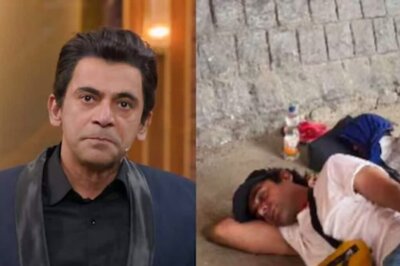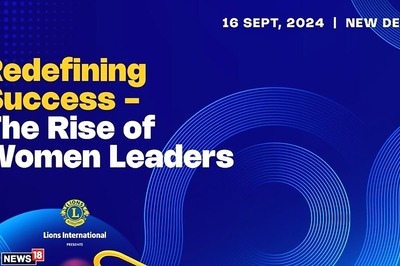
views
On the World Heart Day, I am conveying to you the wishes of all my colleagues involved in the heart care of children. We should all pledge to treat ourselves and our children to a healthy life. I say this because it is now clear that more than 90% of our health is in our own hands.
Today, unfortunately, India is the diabetes capital of the world. We need to correct this ignominious label and we can do it quite easily. That is because this disease called Type 2 diabetes is, in a vast majority, a self-inflicted disease, and related purely to our diet. This condition of diabetes and pre-diabetes is behind most of the cardiovascular ill health existing amongst us today. We, therefore, need to inculcate good eating practices in ourselves and our children.
Unlike when I was growing up, it is clear today that excess intake of sugar (both the sweet form and the hidden form) is behind the onset of diabetes. The old paradigm of the 1970s, that fats are the cause of atherosclerosis and obesity, is now thrown out of the window.
The mantra today is to avoid having sugar and processed carbohydrates that cause high insulin levels, which, as we know, is a storage hormone. Persistent high insulin levels lead to stiffening of our arteries and is the reason we are all falling prey to the dreaded trio of diabetes, cardiovascular risk, and kidney disease. Especially, the excess consumption of fructose, which is an integral part of the sugar molecule and ubiquitous in fruits, goes undetected as it has a zero glycemic index, is now identified as a major culprit. Excess fructose (like alcohol) needs to be avoided as that leads to fatty liver and all its undesirable consequences. The other thing to be steered clear of are vegetable seed oils, which are supposed to be pro-inflammatory, since we know today, inflammation is another factor behind the cardiovascular disease.
Today, a healthy diet of saturated fats, proteins and high fibre carbohydrates is recommended. Healthy children look cute but are really not healthy. Rather, we need to make our children lean and active.
The bulk of our work in Paediatric Cardiac Society of India (PCSI) goes towards looking after children who are born with structural defects of the heart, or congenital heart conditions. I wish our patients, who were born with Congenital heart defects (CHD) a healthy and fulfilling life.
The treatment of CHD, both medical, interventional and surgical, has now achieved a high level of success in improving the quality of life of patients. The government has opened several hospitals such as AIIMS and has introduced schemes for the benefit of families from lower socio-economic status. Those eligible must avail of them so that their children can benefit from knowledge and technology. But there is a downside. While the lower socioeconomic strata are covered by government schemes, and the rich can afford an even expensive treatment, the tax-paying middle class has still nowhere to go to. Government hospitals are overburdened and have long waiting lists. Private hospitals are expensive and beyond the scope of in-pocket payment for most.
There needs to be medical insurance to cover this class of society but there is no private insurance today that covers birth defects. This is in direct contravention of the Insurance Regulatory and Development Authority (IRDA) recommendation of 2019, wherein it states that no internal or external birth defects may be excluded. And yet this situation continues. The reason is that most parents seek insurance cover only after a congenital defect is detected. Now, this would be a 100% loss for the insurance company. Therefore, the reluctance to cover congenital conditions.
We, in PCSI, have proposed a way out: The enrolment for insurance should be during the first three months of pregnancy. At this time, it is too early to determine the presence of CHD (Fetal echo can detect heart defects only after 18 weeks). Hence, insurance companies would not consider it a pre-existing illness.
The mother, her antenatal care, future antenatal checks, delivery, and the child for a predetermined period into his/her life – all would be covered.
With an incidence of only 1 in 100 live births, coverage of CHD by insurance cannot be a loss for the insurance companies. It would provide the middle class with antenatal echocardiography which will go a long way in preventing birth of poor prognosis conditions and top-level coverage in private hospitals for those carried to term. Private hospitals would also benefit from improved paying capacity of domestic patients since they too are a significant arm of healthcare in our country. Introducing such an insurance would therefore be a win-win for all and I urge insurance companies to introduce this product and advertise it widely. If travel insurance can work and become obligatory, even when accidents are so rare, why not this?
I hope we will see the new dawn for young parents who can then stop running from pillar to post upon the surprise diagnosis of a life-threatening birth defect in their newborn child.
I call upon the society, government and insurance companies to carefully consider this proposal.
Dr Rajesh Sharma is President, Pediatric Cardiac Society of India & Senior Consultant, Cardiac Surgeon at Apollo Indraprastha Hospital, New Delhi. The views expressed in this article are those of the author and do not represent the stand of this publication.
Read all the Latest Opinion News and Breaking News here

















Comments
0 comment